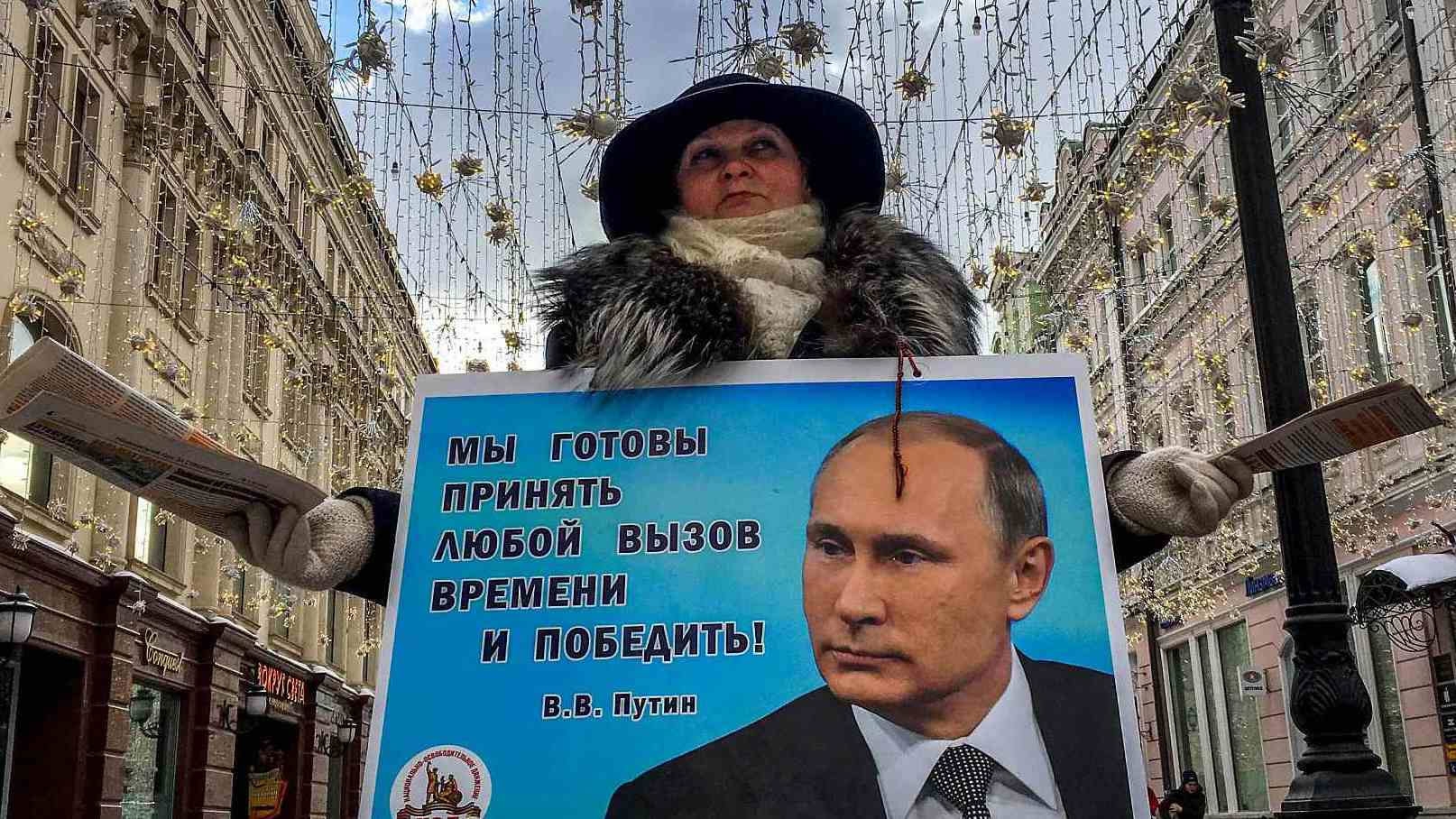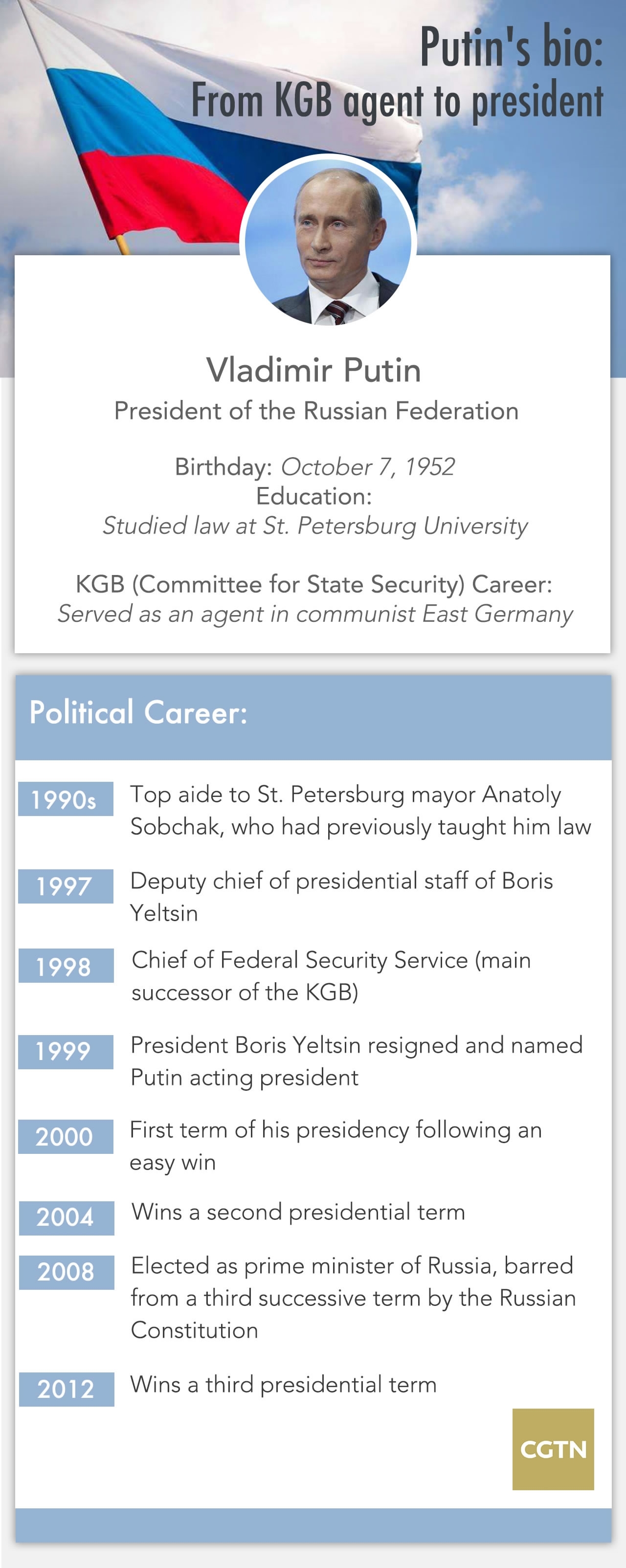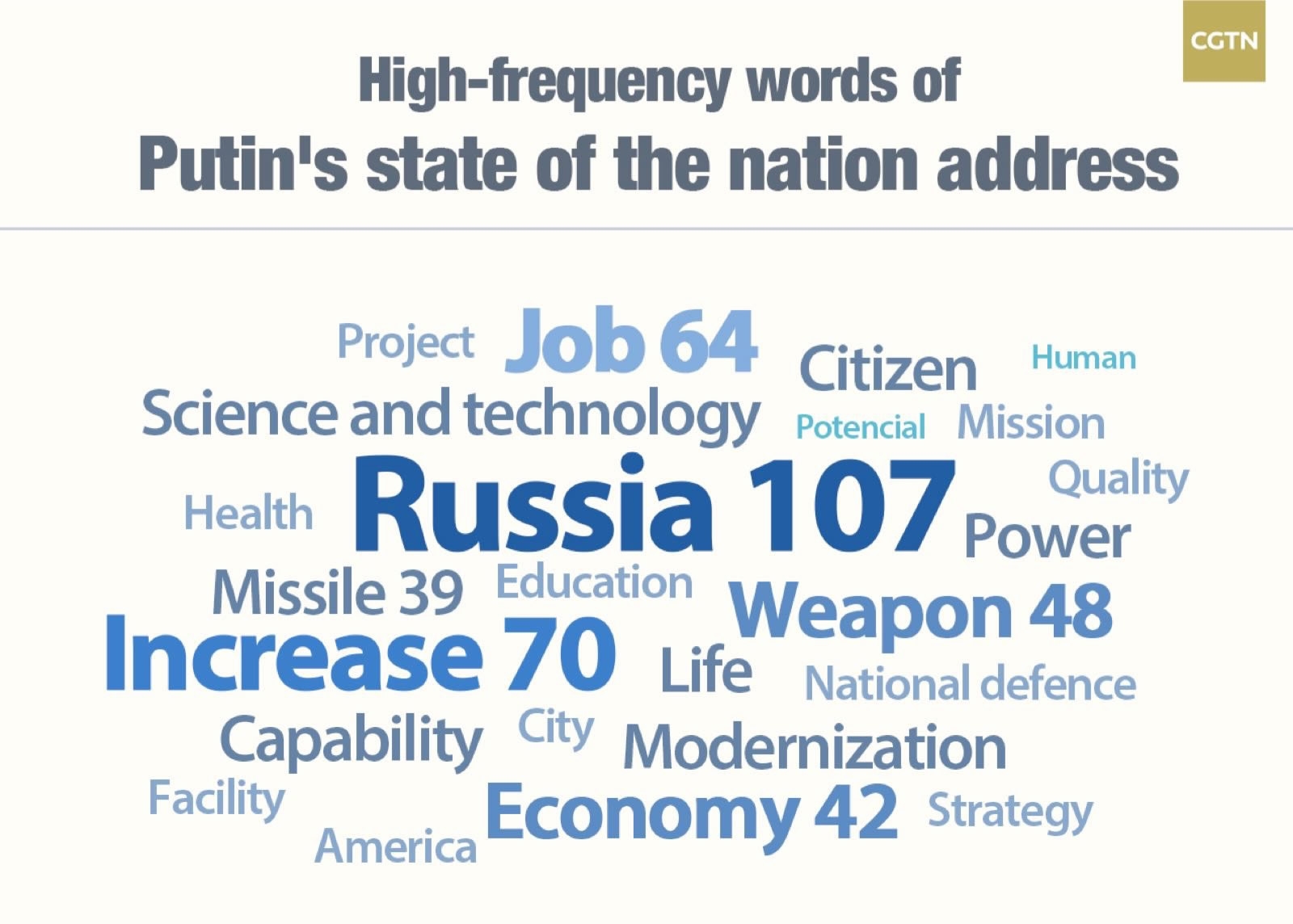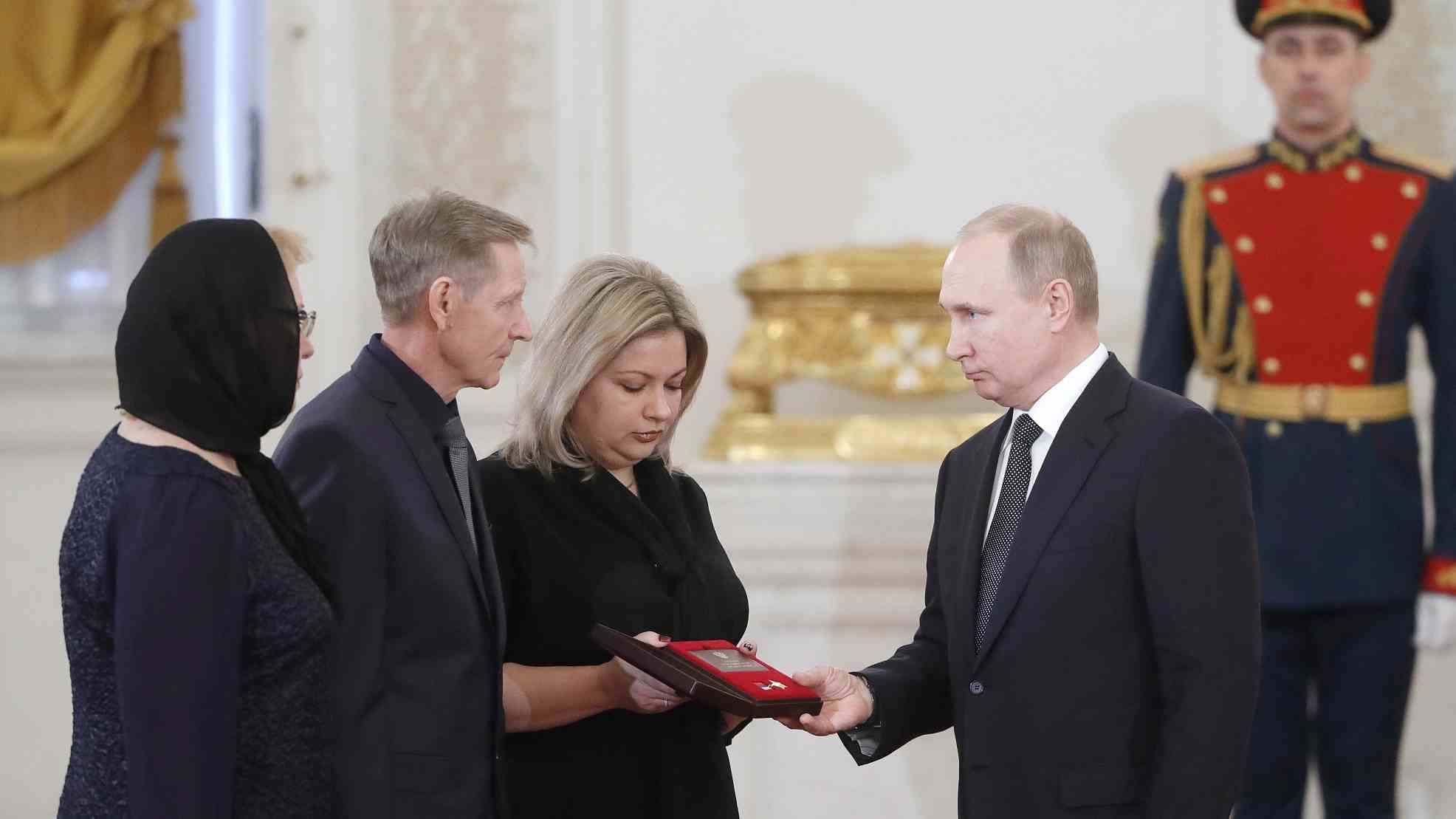
Politics
12:04, 17-Mar-2018
An unsurprising Russian presidential election
By Zhang Dan, Duan Fengyuan

Around 110 million Russia's registered voters will head to the polls to vote for their next president this Sunday, with the incumbent President Vladimir Putin expected to win.
If no candidate with a majority votes stand out in the first round of voting, a second round will be held; however, it is not expected this time due to an insurmountable margin between Putin and other candidates.
According to the most recent polls published by the state-owned Russian Public Opinion Research Center, Putin is ahead in polls with 69 percent. The Communist Party's Pavel Grudinin who ranked second has only a tenth of that.
Who are the main candidates?
There are altogether eight contenders competing for the presidential office. Here is a list:

Vladimir Putin
Putin has been in power either as president or prime minister since 1999. This time, he runs for president as an independent candidate, which is a move seen as a break from the United Russia party.
"It depends on the will of people and the will of each citizen of Russia which path our country will choose, and the future of Russia and our children depends on this," he stressed in a special address to voters, TASS reports.

CGTN Photo
CGTN Photo
Pavel Grudinin
Grudinin is put forward by the Communist Party of the Russian Federation. As a prominent businessman who runs a former state farm outside Moscow, he was elected deputy in the State Duma three times.
Vladimir Zhirinovsky
As a veteran among this year's candidates, Zhirinovsky has run six presidential elections since the collapse of the Soviet Union, which is more than Putin has. He is the leader of the ultra-nationalist Liberal Democratic Party of Russia, known for his aggressive and controversial statements. For instance, he has praised international sanctions on Russia, saying they'd helped the country's economy.
Ksenia Sobchak
As the only female candidate for this year's presidential elections, Sobchak is now the most high-profile liberal candidate. She is the daughter of Anatoly Sobchak, former mayor of St Petersburg, whom Putin has close links to, but Sobchak proposes fresh blood in Kremlin and better relations with the West.
Boris Titov
A businessman and head of the Growth Party organization, Titov is also a business ombudsman who represents the interests of big business close to Kremlin, but 87 percent of Russians polled by the Public Opinion Foundation in December 2017 said they'd never heard of him, CNBC reports.

CGTN Photo
CGTN Photo
Grigory Yavlinsky
Yavlinsky in 2016 said that he expected to beat Putin in the 2018 presidential elections as a co-founder of the Yabloko Russian liberal opposition party, which embraced good relations with Europe and free markets.
Sergey Baburin
Representing the nationalist Russian All-People's Union party, Baburin served in the war in Afghanistan for a year in the early 1980s. He has also been a member of the Russian Duma three times.
Maxim Suraykin
Suraykin advocates a Soviet-era socialist economy and promised to close the income gap between the workers and management as a candidate for the Communist Party.
What to be achieved in Putin 4.0?
Putin delivered his annual State of the Nation address in Moscow on March 1. The Russian leader used the address to outline his policy for a widely anticipated new six-year term in the Kremlin in the coming presidential elections.
Here are the high-frequency words that we can see from his annual address.

CGTN Photo
CGTN Photo
Russia's future in the coming 6 years can be pictured through the features below.

CGTN Photo
CGTN Photo
Read more: Putin says the coming years will be 'decisive' for Russia
Keywords of Putin 3.0
Six years ago in 2012, Putin started his third presidential term. During the past 6 years, four keywords have been memorable.
Annexation of Crimea
On December 19, 2017, the UN General Assembly voted in support of a resolution on the human rights situation in Crimea. UN officially recognized Russia as an occupying power in Crimea.
The year of 2017 saw the highest level of violence in eastern Ukraine since the conflict in Donbas erupted.

Supporters of Russian President Vladimir Putin gather for a rally to celebrate the fourth anniversary of Russia's annexation of Crimea at Sevastopol's Nakhimov Square on March 14, 2018. /VCG Photo
Supporters of Russian President Vladimir Putin gather for a rally to celebrate the fourth anniversary of Russia's annexation of Crimea at Sevastopol's Nakhimov Square on March 14, 2018. /VCG Photo
Ukraine and Russia were once allies whose intelligence agencies often worked closely together, but relations deteriorated after Russia's annexation of Crimea in 2014 and support for pro-Russian separatists in eastern Ukraine.
Russia's role in Syria
From September 2015 to the end of 2017, in less than two years, Russia's achievements in Syria can be deemed fruitful. It has recovered 12,000 square kilometers and 586 residential areas, including 150 towns.
"Foreign orders for Russian weapons to be delivered over the coming years amount to almost 50 billion," Dmitry Shugayev, head of the Federal Service for Military-Technical Cooperation said in March 2017.

Russia's President Vladimir Putin (R) gives a Gold Star medal of the Hero of the Russian Federation to relatives of the late pilot Roman Filipov who was killed in Syria, during a ceremony to present state awards at the Moscow Kremlin on February 23, 2018. /VCG Photo
Russia's President Vladimir Putin (R) gives a Gold Star medal of the Hero of the Russian Federation to relatives of the late pilot Roman Filipov who was killed in Syria, during a ceremony to present state awards at the Moscow Kremlin on February 23, 2018. /VCG Photo
On December 11, 2017, Putin made a surprise visit to Syria and announced that Russia would withdraw from Syria.
Russian economy
A recovery in trade, rising oil prices, and growing macroeconomic stability – according to the World Bank’s latest Russia Economic Report (No. 38 in the series).
The report finds that unemployment rates are at a historical low: the lowest level of unemployment was registered in Moscow (1.3% in the third quarter of 2017) and Saint Petersburg (1.7%).

CGTN Photo
CGTN Photo
Andras Horvai, World Bank Country Director and Resident Representative in the Russian Federation, said in a statement that "declining inflation and growing real wages led to a modest decline in Russia’s poverty rate in the first half of 2017, compared to the same period last year."
Sanctions
The Council of the European Union decided on the extension of economic sanctions against Russia on December 21, 2017. The current restrictions against Moscow will be extended until July 2018, due to Russia's intervention in Crimea in March 2014.
The US Treasury announced in January 2018 that it has added 21 individuals and nine entities related to Russia and Ukraine to its sanctions list.
The designated persons included several Russian officials, and high-level officials in the self-proclaimed Donetsk People's Republic and Luhansk People's Republic, said the Treasury in a statement.
Companies involved in building infrastructure in Crimea were among the ones targeted.

SITEMAP
Copyright © 2018 CGTN. Beijing ICP prepared NO.16065310-3
Copyright © 2018 CGTN. Beijing ICP prepared NO.16065310-3